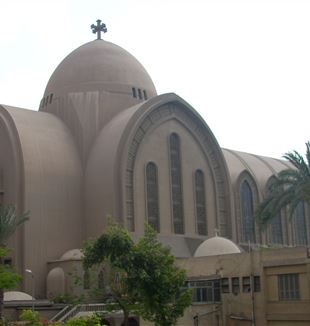
The Hope of Egypt
The Jewish Professor of Law, Joseph Weiler, explains, in an article published in the Italian daily Il Foglio, what the real enemy of dialogue is, in light of the words by Benedict XVI and of what he experienced at the Meeting of Cairo this past October.The attack on the Coptic Saints Church in Alexandria, Egypt, which occurred during the Midnight Mass of January 1st, taking 25 victims, not only exceeds the limits of the terrorist status quo and makes even more dramatic the unresolved issues of co-existence between religions in the Arab world, but also reintroduces the enigma of the very identity of the West, a question to which Joseph Weiler, Professor of Law at New York University, has dedicated his career, one of constant inquiry into the Judeo-Christian elements that have informed the essence of European history.
It seems that terror wanted to hit the outpost of dialogue, as witnessed in its discrete powerfulness by the Meeting of Cairo, a two-day public event organized by Muslims and Catholics, in which you participated. What can you tell us about that experience?
The Meeting in Cairo in which I had the privilege to participate as a peripheral observer was moving for two principal reasons. First because of a very special spirit of true human contact, transcending political pieties about "peace and brotherhood." The emblematic moment for me was, of course, the spontaneous gesture of Wael Farouq (a Muslim) and Andrea Simoncini (a Catholic) to accompany my children and I as we were forced to walk close to two hours, because of the sanctity of the Sabbath, back from the Citadel to our hotel on Friday night. The second moment was listening to the speech of one of the Italian visitors, who, in the heart of Cairo, from the very stage on which Obama stood a year earlier, delivered his message, which, whilst not evangelizing, cordially but boldly was premised on his belief in Christ. It is not only the fact that he could, as a matter of freedom of speech, make such a statement. But much more importantly, that it was considered normal, natural, and expected–by his Muslim hosts and primarily Muslim audience.
Do you think that Egypt–a thousand-year crossroads of cultures–may continue being an example of dialogue for different religions?
This brings me to the final and most important point about the Cairo Meeting. Typically, in trying to construct a dialogue between, say, West and East, we consider religion to be "conflictogenic"–the source of enmity, suspicion, contempt, and violence. So we try to set religion aside and find other common ground. It is a model that will never work at any deep level. What the Cairo Meeting tried to do was to find common ground not by setting religion aside but by acknowledging its importance for the life of so many, by not inadvertently "secularizing" our interlocutors (and ourselves) as the only means to dialogue with them but by doing the opposite–meeting them as a community of faith speaking to a community of faith. It is an alternative strategy for dialogue. It is audacious; it is fragile–and the bombing in Alexandria underlines its fragility. But it offers immense hope. For me, it is the only way to dialogue–with full respect to the essential identity of my interlocutors, and with full respect toward my own identity. That is what the Cairo Meeting was about.
Benedict XVI spoke of an action which "offends God and the whole of humanity," a tough judgment that recalls the famous speech in Regensburg. Do you agree with this "radical" perspective, for which, without truth, there can't be a real dialogue, but only strategy, cunning, and violence?
Once again, as a non-Christian, and non-Catholic, I am impressed by the lucid and fearless reaction of the Pope. The attack in Alexandria was perpetrated not against oppression, not even against a political or an ideological target. It was not against a group that in any way or shape could threaten the perpetrators. It was an indiscriminate attack, religiously motivated, simply based on the way the victims choose to worship the God of Abraham, Isaac, Ishmael, and Jacob. The Pope is right: it is obviously an offense against God–in fact, it is the desecration of the name of God, Allah, in public–and it is an offense against all of humanity, believers and non-believers alike. To speak the truth–and it is clear that the currency of this Pope is the truth rather than diplomatic pieties–is not against dialogue, for what kind of dialogue is it, if the interlocutors paper over differences?